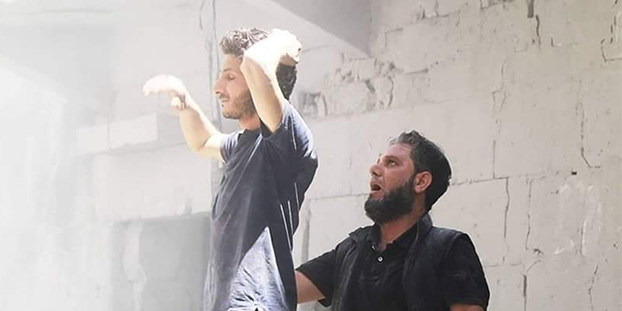For those who still dare to follow the news from Idlib in Syria, it is difficult to escape feelings of despondency and powerlessness.
The war there has become too complex; a witches’ cauldron where dozens of parties play their cynical game and make life hell for the nearly three million citizens. Faced with so much violence, combined with the impotence of the international community, a natural reaction is to look away. But this means the criminals feel empowered to continue their murderous game with impunity.
In the end, it is not complex. The war in Idlib is primarily being fought against civilians, against men, women and children. Hospitals, markets, residential areas, and schools have been bombarded for months with barrel bombs, phosphorus grenades, rockets filled with cluster bombs and infinitely more weaponry. And we know who is dropping the bombs.
This is what hell looks like
This is what hell in Idlib looks like. Imagine: a month ago your house was hit by a missile. Fortunately nobody was there when it struck and you were able to repair the damage with the last of your savings. You are ready to move back in. You go to the market with your wife to get some vegetables, fruit and, if you’re lucky, some meat. Out of the blue, a huge series of explosions. Debris, dust, gunpowder and scorched meat, people screaming and sirens everywhere. You find shelter in a store, your heart beats in your throat and after a while, disorientate, you find your way out. Later, you hear that three people were killed. None of them family or friends, thank God.
Your father isn’t Superman
Imagine your children’s fear. Their eyes filled with panic when a fighter jet flies over. They look up in your eyes and expect you to help them, like you’re superman. When you hear gunfire nearby, you say it’s shots being fired into the air at a wedding.
The whole village wiped out
Imagine: after weeks of bombing, you have to flee the approaching soldiers of the Syrian army and their loyal militias. You only get a few kilometres before you have to camp for the night in an orchard. From there, you can see the tanks and artillery wiping out your entire village. You see the fields and orchards burning. Later, you’ll see video of triumphant soldiers, drunk with victory — Syrians, Russians and elsewhere, plundering valuables from the ruins of the houses in your village. You know you’ll never return. Every day you regret that you and your family didn’t flee to Europe when it was still possible.
No one in Idlib is safe. The people have been abandoned, despite the consternation of the international community, international humanitarian law and human rights. The people of Idlib are powerless against the violence that is being unleashed on them.
It’s understandable that politicians in the Netherlands don’t know what to do about Syria. But doing nothing is a choice – and three million residents of iIdlib are paying the price. While there is no easy solution, a little more imagination and a lot more will would already make a difference. When a terrorist butchers worshipers in a mosque in New Zealand, when a terrorist drives into party-goers in Nice, we draw a line and show that the terrorists wopn’t get their way. Why don’t we do that now? Why aren’t doctors standing up after more than 23 hospitals were destroyed in the last three months? Why do we choose to do nothing when in Syria, men, women and children, are bombed every day?
Break the silence
The people of Idlib have no choice but to try to survive and to keep hoping for a miracle. Pessimism is a luxury that they can’t afford. But the miracle will never come so long as those dropping the bombs feel a sense of impunity. The silence about what’s happening in Idlib is music to their ears. They know: silence means acceptance. For that reason alone, we must break the silence.
Read the Idlib Calling blog. We call Ahmed nearly every week. He works in theatre in Idlib and is a partner of PAX. He and his family are now in the middle the war.
Follow PAX on social media for updates from our partners in Syria. Or take part yourself — use the hashtag #EyesonIdblib




